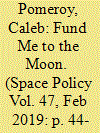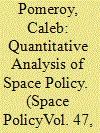|
|
|
Sort Order |
|
|
|
Items / Page
|
|
|
|
|
|
|
| Srl | Item |
| 1 |
ID:
169296


|
|
|
|
|
| Summary/Abstract |
The likes of Elon Musk and Jeff Bezos now occupy the headlines once dominated by Apollo and Soyuz. Described as New Space versus Old Space, debate surrounds the emerging commercial space industry and the role of nontraditional actors in the evolving contemporary space exploration environment. This article enters this debate by adopting a sociological approach to investigate the role of crowdfunding in financing space exploration today. We interviewed crowdfunded space project creators in disparate locations, from Moscow to Silicon Valley, who attracted capital ranging from $200 to over $1 million. We attempt to uncover their experiences using this distinctly social financing mechanism and find that although crowdfunding is unlikely to solve all of today's research funding conundrums, it does appear to increase access to space in unique ways. We argue, however, that the most interesting dynamic of this phenomenon is the way in which crowdfunding contributes to an increasingly democratic exploration environment and how this might impact space science research and the power structures of the space industry. This article concludes by considering possible implications of this trend and derives practical suggestions for both policymakers and individuals who may be considering the use of crowdfunding to finance space science research and exploration projects.
|
|
|
|
|
|
|
|
|
|
|
|
|
|
|
|
| 2 |
ID:
169295


|
|
|
| 3 |
ID:
169329


|
|
|
|
|
| Summary/Abstract |
Decades of space policy research have yielded an eclectic, multidisciplinary research agenda replete with findings that are relevant for theory and policy. Absent from the literature, however, is a systematic review and discussion of the data and research methods used to ascertain these findings. This is important for research progress because data and method choice have implications for the validity of the findings, potential contributions to theory, and efficacy of suggested policy prescriptions. Motivated by advances in computational social science, this article reviews the quantitative space policy literature and finds scope for further development with respect to data sources, method selection, and substantive topics of inquiry. Given these findings, two methodological areas are introduced, namely text and network analysis, and their utility is illustrated through an extension of a previous public opinion study, as well as a novel application regarding state support for international space law. This review might be relevant to scholars and practitioners interested in the empirical study of space policy.
|
|
|
|
|
|
|
|
|
|
|
|
|
|
|
|
| 4 |
ID:
186595


|
|
|
|
|
| Summary/Abstract |
A central theme in the study of international relations is that anarchy requires states to set aside moral concerns to attain security, rendering IR an autonomous sphere devoid of ethical considerations. Evolutionary and moral psychology, however, suggest that morality emerged to promote human success under such conditions. It is not despite anarchy but because of anarchy that humans have an ethical sense. Our argument has three empirical implications. First, it is almost impossible to talk about threat and harm without invoking morality. Second, state leaders and the public will use moral judgments as a basis, indeed the most important factor, for assessing international threat, just as research shows they do at the interpersonal level. Third, foreign policy driven by a conception of international relations as an amoral sphere will be quite rare. Word embeddings applied to large political and nonpolitical corpora, a survey experiment in Russia, and an in-depth analysis of Hitler's foreign policy thought suggest that individuals both condemn aggressive behavior by others and screen for threats on the basis of morality. The findings erode notions of IR as an autonomous sphere and upset traditional materialist–ideational dichotomies.
|
|
|
|
|
|
|
|
|
|
|
|
|
|
|
|
|
|
|
|
|